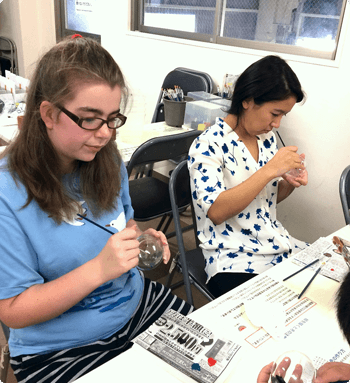
Life Experience and Practice Course is a comprehensive, skill-based pre-requisite course designed for students with mild to moderate learning needs enrolled in the TIPS Certificate of Completion Program.
The course aims to develop skills for independent living, personal care and safety, and technical skills applicable for employment that would promote age-appropriate self-advocacy skills, independence, and develop a framework for responsible decision making.
Students in the LEAP course are also taught specific study skills that are integral and applicable in the mainstream classroom such as reading comprehension, writing a composition, and note-taking skills.
Students who complete the LEAP course will be able to successfully engage with the coursework appropriate to their level in the mainstream classroom. They will also gain competency in valuable social, personal, and health-related areas that would allow them to operate with a degree of independence in society.
LEAP Course has 10 central themes divided into units that forms a holistic approach in learning:
Self-Management
Emphasizes the Executive Functioning Skills of Flexibility, Planning/Organization and Time-Management. This unit aims to develop and choose ideal work practices and effective study skills. Students apply these learned skills directly in the mainstream classroom all-year, and the academic subject teachers supplement classroom activities to practice these self-management skills.
Belonging and Integrating
Addresses the need to develop a sense of personal identity that some students could find difficult to establish and maintain. Students are given an opportunity to explore how to establish meaningful presence to a group and the community, and to develop cooperative and group work skills. Bullying- a significant source of anxiety among middle school and high school students, is also addressed in this unit.
Communication Skills
Focuses on developing skills for active listening and awareness of the social aspects of effective communication coined as: Social Thinking, developed by U.S. based speech and language pathologist, Ms Michelle Garcia-Winner. With the use of the Social Thinking framework and activities, students are taught how to listen to what their fellow peers have to say with respect and sincerity, and provide opportunities to actively engage in age-appropriate, meaningful conversations. Students are also taught skills on how to decipher academic questions that may involve multi-step thinking such as to compare and contrast, explain, analyze, evaluate, etc., and explain their own ideas effectively in both written and verbal language.
Physical Health
Targets the relationship between physical health and positive self-image. This unit seeks to complement natural adolescent concerns such as body size, skin conditions, personal hygiene, etc., with appropriate information on healthy lifestyle choices. The importance of rest and techniques for relaxation are also covered in this unit.
Friendship
Deals with issues relating to the unit of Belonging and Integration, this unit offer students an opportunity to examine the nature and role of friendship itself, and the ways in which friendships change and develop over time. As students deal with the environment unique to international school, where families do not hold permanent residences, and cultural differences may get in the way of forming friendships familiar to one’s cultural norm, students may have a tough time adjusting. This unit provides our students an opportunity to understand their place in the international community and how to embrace diversity available to their new social environment.
Relationships in our Lifetime
As students develop their social skills and awareness of the need to belong and establish their self-identity, students will meet and form various degree of relationships outside the home and school. As childhood friends may drift away or find themselves in different cliques, relationship with our parents changes or recognizing admiration and appreciation for the opposite sex, this unit addresses the need to decode different social relationships and how to maintain positive relationships among family, friends, and other members of the community. This unit aims to provide students with strategies to adapt to change and flexibility in various social situations, and to understand the ways to establish and maintain meaningful friendships.
Emotional Health
Addresses the current transitional challenges experienced by students from children to teenage years to young adulthood in terms of social structures and expectations. Students will explore different strategies to equip themselves with independence and critical judgment and the personal resources needed to cope with change, to have the confidence to self-advocate and face the uncertainty of the future with confidence.
Influences and Decisions
Introduces the skills needed for responsible decision making, exploring the significant influences of each decisions, evaluating the benefits and consequences, and choosing the course of action that causes the least amount of harm to the fewest possible people involved. Responsible decision making calls for consideration of the wisdom of authorities- the civil law, opinion of parents, the wisdom of adults in general, and if applicable, the teachings of religion. This unit aims to enforce and value responsible decision making to our students to help them become responsible global citizens.
Career Education
Aims to explore the knowledge and skills set that will fit to each student’s prospective career path. Career education will also reinforce strong practices of executive functioning skills essential to the world of work. Students will get the chance to explore different careers and the practices involved in various businesses. Students will also learn the practices involved in applying for a job, building a resume, and showing up to job interviews.
Personal Safety
This unit is dedicated to promote safety within the physical environment (road and fire safety, accident prevention in the home and school, understanding fire escapes, etc), and personal awareness and skills for self-protection (self-defense, protection from harassment or an assault, how to identify real threats vs. harmless unfamiliar scenes, and to manage anxiety about other people’s behavior or attitude) This unit is connected to the theme of belonging and integrating, and effective communication to promote confidence and self-advocacy.
